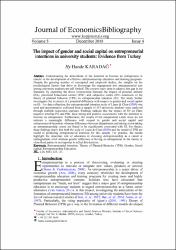Please use this identifier to cite or link to this item:
https://hdl.handle.net/20.500.11779/382Full metadata record
| DC Field | Value | Language |
|---|---|---|
| dc.contributor.author | Karadağ, Hande | - |
| dc.date.accessioned | 2019-02-19T20:07:07Z | |
| dc.date.available | 2019-02-19T20:07:07Z | |
| dc.date.issued | 2018 | - |
| dc.identifier.citation | Karadag, H. (2019). The impact of gender and social capital on entrepreneurial intentions in university students: Evidence from Turkey. Journal of Economics Bibliography, 5(4), 271-279. | en_US |
| dc.identifier.uri | https://hdl.handle.net/20.500.11779/382 | - |
| dc.description.abstract | Understanding the antecedents of the intention to become an entrepreneur is crucial in the development of effective entrepreneurship education and training programs. Despite the growing number of conceptual and empirical studies, the insights on the psychological factors that drive or discourage the engagement into entrepreneurial acts among university students are still limited. The current study aims to address this gap in the literature, by exploring the direct relationships between the impact of personal attitude (PA), perceived behavioral control (PBC) and subjective norms (SN) constructs of the theory of planned behavior (TPB) on entrepreneurial intention (EI). The study further investigates the existence of a potential difference with respect to gender and social capital on EI. For data collection, the entrepreneurial intention scale of Linan & Chen (2009) was used and questionnaires collected from a sample of 113 university students were analyzed through multiple regression analyses. Findings indicate that the impact of SN on EIare negative whereas PA and PBC have strong and positive associations with the intention to become an entrepreneur. Furthermore, the results of the independent t-tests show do not indicate a meaningful difference with respect to gender and social capital and entrepreneurial intention, whereas differences between departments and taking or not taking an entrepreneurship course are found to be significantly associated with EI. For theory, these findings imply that both the scale of Linan & Chen (2009) and the model of TPB are useful in predicting entrepreneurial intention for this sample. For practice, the results highlight the important role of education in choosing entrepreneurship as a career at undergraduate level whereas gender difference or having an entrepreneur in the family or close third parties is not reported to affect this decision. | en_US |
| dc.language.iso | en | en_US |
| dc.publisher | KSP Journals | en_US |
| dc.relation.ispartof | Journal of Economics Bibliography | en_US |
| dc.rights | info:eu-repo/semantics/openAccess | en_US |
| dc.subject | Entrepreneurial intention | en_US |
| dc.subject | Gender | en_US |
| dc.subject | Entrepreneurship Education | en_US |
| dc.subject | Social capital | en_US |
| dc.subject | Theory of Planned Behavior (TPB) | en_US |
| dc.title | The Impact of Gender and Social Capital on Entrepreneurial Intentions in University Students: Evidence From Turkey | en_US |
| dc.type | Article | en_US |
| dc.authorid | Hande Karadağ / 0000-0002-5388-807X | - |
| dc.identifier.wosquality | N/A | - |
| dc.identifier.scopusquality | N/A | - |
| dc.relation.publicationcategory | Makale - Uluslararası Hakemli Dergi - Kurum Öğretim Elemanı | en_US |
| dc.identifier.endpage | 279 | en_US |
| dc.identifier.startpage | 271 | en_US |
| dc.identifier.issue | 4 | en_US |
| dc.identifier.volume | 5 | en_US |
| dc.department | İİSBF, İşletme Bölümü | en_US |
| dc.institutionauthor | Karadağ, Hande | - |
| item.fulltext | With Fulltext | - |
| item.languageiso639-1 | en | - |
| item.grantfulltext | open | - |
| item.cerifentitytype | Publications | - |
| item.openairecristype | http://purl.org/coar/resource_type/c_18cf | - |
| item.openairetype | Article | - |
| crisitem.author.dept | 04.03. Department of Business Administration | - |
| Appears in Collections: | İşletme Bölümü Koleksiyonu | |
Files in This Item:
| File | Description | Size | Format | |
|---|---|---|---|---|
| Ent Int.pdf | Yayıncı Sürümü - Makale | 609.03 kB | Adobe PDF |  View/Open |
CORE Recommender
Sorry the service is unavailable at the moment. Please try again later.
Items in GCRIS Repository are protected by copyright, with all rights reserved, unless otherwise indicated.